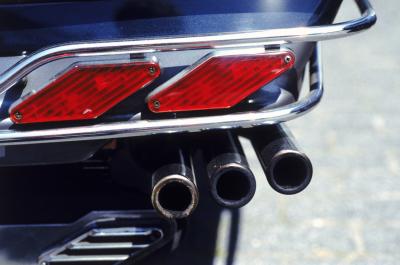
If there is ever a strong smell of engine exhaust in the vehicle, it means there is an exhaust leak somewhere toward the front side of the vehicle. It is imperative to have the exhaust fixed immediately as engine exhaust contains carbon monoxide, which will poison you. If the vehicle must be driven, drive with all windows down and the heating/air conditioning turned off to limit your exposure to the noxious fumes. There are several places exhaust fumes could leak from that would find their way into the cabin.
With the engine running, check the exhaust manifolds for any leaks (remember exhaust is very hot and will burn you so do not touch it until the engine has completely cooled). Potentially, there could be leaks between the exhaust manifold and the cylinder head, or the exhaust manifold and the exhaust down pipe. If leaks are found, replace the leaking gasket. Inspect the exhaust manifold for extreme corrosion; in rare cases, exhaust manifolds have been known to corrode and may need to be replaced altogether.
The exhaust gas recirculation valve directs exhaust back into the intake manifold. If the EGR valve gasket has failed, it will begin to leak exhaust gas, which may find its way into the cabin. Check around the EGR valve for any gasket leak, as well as the piping leading to the EGR valve for any corrosion or damage.
If the catalytic converter becomes plugged, it will create intense back pressure that can cause the mating gasket between the exhaust pipe and the catalytic converter to fail and leak exhaust fumes. Even from under the car, these noxious fumes can make their way into the vehicle cabin. Check for any exhaust leaks around the mounting point between the exhaust pipe and catalytic converter.
Over time, exhaust pipes can corrode and develop rust holes, especially in states that use salt for ice and snow control in the winter. Visually inspect all pipe from the engine back for any extreme corrosion or damage from other road conditions and replace as necessary.